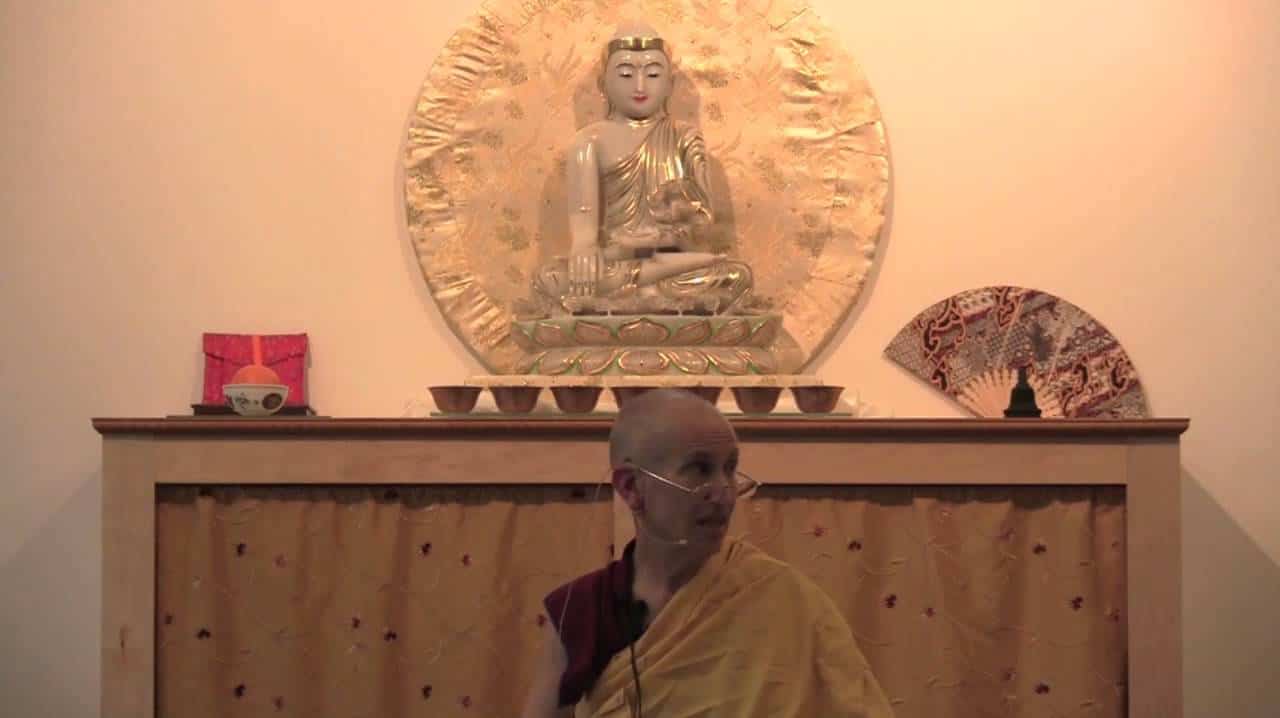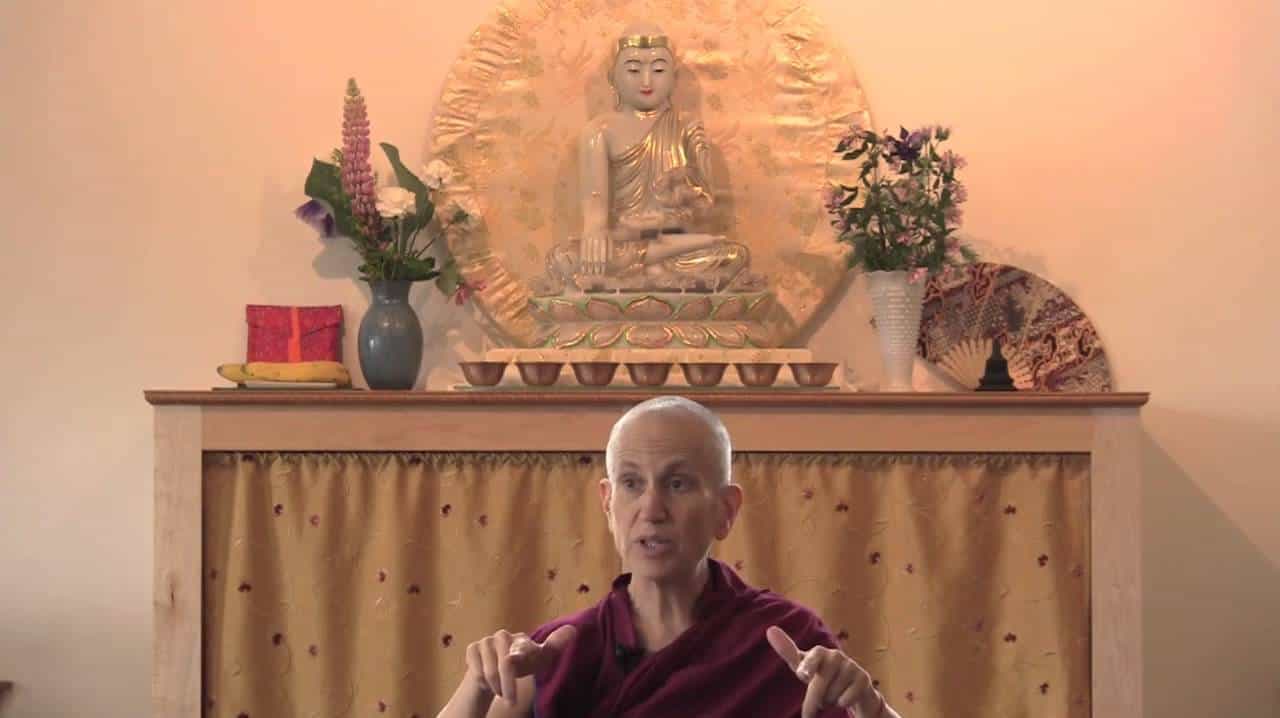Verse 19: Criticism, babble and chatter
Part of a series of talks on Gems of Wisdom, a poem by the Seventh Dalai Lama.
- Is the mind that wants to criticize others happy?
- How to use our speech more wisely and kindly
Gems of Wisdom: Verses 18-19 (download)
I don’t know if we finished Verse 18 completely. Verse 18 was:
What sharp weapons slice hearts when people meet with each other?
The saying of harsh and cruel things and the criticizing of others’ faults.
We do that a lot. Maybe we’d better go on to the next verse. [laughter]
It’s interesting to think: When I really get into a critical mind, what am I actually wanting at that time? When we get into one of these moods where we’re just criticizing, criticizing, criticizing everybody and everyone…. You know, one of those moods? Then I stop and say, “What is it that I’m really wanting? What is pushing me to speak like this? I’m wanting something. What is it that I’m really wanting?” It’s a very interesting question to ask myself, because sometimes when I ask that question to myself, the answer is “I want to be happy with myself. I want to be happy with myself, but at that moment I’m not happy with myself.” So what do I do when I’m not happy with myself? I criticize other people. Because if I can bring other people down, then my twisted way of thinking thinks that then I must be better. You get what I mean?
One of my teachers, Geshe Ngawang Dhargyey, used to say, we get together with our friends and we trash other people in our speech, and then the conclusion of the conversation is that we’re the two best people in the world.
Why do I have to try and make myself the best person in the world? Because I don’t feel good about myself to start with. So then I have to stop and say, “Well, how can I feel good about myself?” And then I have to look at what behavior have I been doing that’s making me not feel good about myself. And what behavior do I need to do so I feel good about myself. That’s one of the things I find when I ask myself why am I criticizing other people.
Then other times I just say, “Well, I’m in a bad mood.” And that just seems like such a good reason, doesn’t it? Like, how can anybody fault you for criticizing everybody if you’re in a bad mood? Because everybody does it. It’s like, how do I let out my bad mood? I go, “Nyah nyah.” Then it’s funny because then I go, “Well that doesn’t solve the problem of my bad mood.” Criticizing other people doesn’t get rid of my bad mood. Doesn’t work at all. It’s a bad strategy. And so now it’s kind of at the point when I say, “Oh, I’m in a bad mood. Well, I need to drop that mood.” It’s just a mood. I need to drop it. And not enhance it. Not build it up. Not use it as a justification for saying who-knows-what about whomever.
I find that kind of works well as a way to temper the negative speech, because I don’t know about you, but I find that when I speak poorly about other people— Well, I usually don’t feel so good about myself when I do that. But then afterwards I’m kind of concerned—when I’m trashing somebody behind their back—that they’re going to find out about it. And then what do I do when they find out that I’ve been talking like that about them behind their back? And then also, the people that I’m saying all these nasty things [about somebody else] to, what are they going to think of me? So in this case maybe some concern with my reputation is useful. Might make me keep my mouth closed.
Then the next verse.
Verse 19
What invisible wind brings weakness and wanders without end?
Indulgence in babble and chatter devoid of any meaning.
The seventh Dailai Lama has been going through different kinds of speech here. “The invisible wind that brings weakness.” You know? You have no energy afterwards. That wanders without end. And at the end of the day you’re like [exhausted]. Well that’s what happens when we indulge in babble and chatter that has no meaning.
We don’t do that, do we? “Yack yack yack yack….” We talk about all sorts of stuff. And then at the end of the day, “I was so busy today I had no time. I had so many things on my list that I wanted to do.” But then we look back and how much time did we spend in the day just talk about this, talk about that…. None of which has any meaning. And, “Oh, I was so short on time. No time to do my Dharma practice tonight. Got to go to bed.”
If we cut back on television and idle talk we have so much more time. That’s why when we do retreats we usually keep silence during our retreats. And then all of a sudden there’s so much time, and you can actually get to know yourself because you’re not always talking about this and that, and forming opinions about things that aren’t really of much consequence.
So, good to monitor the speech and think:
- Is what I’m saying appropriate at this time?
- Is what I’m saying bringing harmony?
- Is what I’m saying truthful?
- Is what I’m saying kind?
Because we create so much karma through this thing [points at mouth]. And now through this thing [mimes typing on keyboard and smart phone]. But if we really monitor it and ask ourselves, then there’s the possibility for transforming how we communicate and how we use our speech. And our speech can be a huge instrument for creating good in the world. Or a huge instrument for creating chaos.
So, let’s be careful with our speech.
Venerable Thubten Chodron
Venerable Chodron emphasizes the practical application of Buddha’s teachings in our daily lives and is especially skilled at explaining them in ways easily understood and practiced by Westerners. She is well known for her warm, humorous, and lucid teachings. She was ordained as a Buddhist nun in 1977 by Kyabje Ling Rinpoche in Dharamsala, India, and in 1986 she received bhikshuni (full) ordination in Taiwan. Read her full bio.


